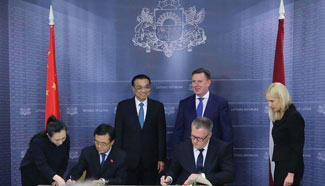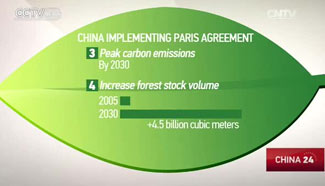BEIJING, Nov. 5 (Xinhua) -- In this year's U.S. presidential race, which comes to its epic conclusion on Tuesday, the Republican nominee Donald Trump accused the Democrats of making use of the U.S. mainstream media to manipulate public opinion.
The media he mentioned included NBC, CNN, CBS, ABC, the New York Times and the Washington Post.
It's true that these media have unanimously stood behind Trump's rival Hillary Clinton and depicted the Republican mogul as unfit to lead and a "Democracy's Wrecking Ball."
The question is whether these media, hailed as "the Fourth Power" in the United States, have operated conscientiously or as tools for interest groups.
Some fifty top TV news anchors and journalists had attended a gathering at the New York home of Joel Benenson, the chief campaign strategist for Hillary Clinton, two days before she announced her candidacy in April 2015, according to emails Wikileaks has published from John Podesta's purported accounts.
What had been discussed at the banquet was off-the-record, but it's noteworthy in a living TV broadcast when CNN anchor Chris Cuomo interviewed Republican Congressman Chris Collins of New York about Hillary Clinton and the election, CNN directly cut the signal right after the congressman mentioned Wikileaks.
Trump cited this as an example of CNN's bias and the mainstream media's collusion with the Democratic Party.
In fact, Western media, though boasting of independence and impartiality, have irresistibly become the vital means for the elite of society to deeply interfer with the political, economic and social reality of the country.
In 1983, 90 percent of the U.S. media was controlled by fifty companies; today, 90 percent is controlled by just six companies. Those six decide what Americans listen to and watch, and ultimately control their political choices.
But Americans are no fools; they're increasingly skeptical of their media. According to Gallup, Americans' trust and confidence in the mass media "to report the news fully, accurately and fairly" has dropped to its lowest level in its polling history, with only 32 percent saying they have a great deal or fair amount of trust in the media, down eight percentage points from last year.
Believing that Trump has received unfair or negative attention by the media, Republicans who say they have trust in the media have plummeted to 14 percent from 32 percent a year ago, the lowest in 20 years.
While mass media is supposed to serve the broader public, they have instead become pawns of interests groups.
In 1988, renowned linguist and political scholar Noam Chomsky co-authored a book with Edward S. Herman, in which he pointed out that the Western corporate media "manufactured consent" in the interests of dominant and elite groups in society.
With "filters" which determine what gets to become "news" -- including media ownership and advertising, he showed how propaganda can pervade the "free" media in an ostensibly democratic Western society through self-censorship.
In the case of the ongoing presidential election in the United States, Rasmussen Reports in mid October released a report, which finds that 56 percent of likely U.S. voters believe it's more likely that many in the media are working to get Clinton elected president.
Moreover, 91 percent of voters in favor of Trump think it's more likely that most in the media are trying to help Clinton, according to the report based on a national telephone and online survey.
Though abandoned by the mainstream media, Trump is adept at utilizing social media to turn himself into an anti-establishment pioneer. While the old forms of media are no friends of Trump, the Republican nominee's saving grace may be in media's newer forms.










